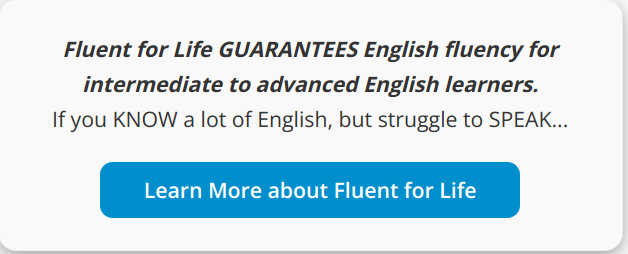English
The Only English Speaking Practice That WILL Get You to Fluency

“I passed the highest level of the official Japanese English test, and I studied in the United States.”
According to the politician’s brochure…
As I was playing with my family at a park in Nagasaki, Japan, a local Japanese politician came over and greeted us. There were about twelve families at the park that day.
When he introduced himself, he even said he wanted to make our area “more international.”
Despite overhearing me speaking English with my children and highlighting it on his brochure, he didn’t say a word to me in English.
I felt like he had missed an opportunity to demonstrate how well he could speak English.
It’s not just him. Many English students know a lot of English, but when it comes to speaking – they struggle.
So when you have a conversation, you’ll feel much more confident because you’ll practice your English the same way native speakers do.
The Biggest Mistake Most English Learners Make With Speaking Practice
Some of the most common myths getting in your way of speaking English fluently were covered in my article on how to speak English fluently.
If you want to become fluent, you need to practice speaking a lot.
Like practicing notes on a piano, repeat phrases to yourself or others until you can say them perfectly, as if you were practicing an instrument.
Learning a language is different from learning an instrument or playing a sport.
Fluency depends on:
How well you understand what is being said
In a conversation, how you react to the other person
In a conversation, you don’t recite words off a list. Therefore, memorizing translations and repeating words won’t improve your speaking skills.
To improve your English, remember the golden rule:
Not output (speaking). Practice comes from input (understanding English like a native).

I know this sounds backwards.
In reality, native children often go through a silent period before they speak. They speak when they understand the language well, and communication flows naturally when they feel ready to do so.
Responses are quick and easy when you understand what the other person is saying and feel confident about what you want to say.
Anxiety is a barrier to speaking fluently when you force yourself to speak before you’re ready. Language researchers have proven this as well.
When you are nervous, you hesitate, forget words, and lose confidence.
You know how painful and awkward it can be to speak in an English class before you’re ready.
How to Practice English if You Don’t Feel Ready to Speak
By getting more input, rather than opening your mouth, you really practice.
In order to achieve fluency, you must understand English deeply. Many English learners have shallow and limited understandings of words and grammar, which is why they can have a large vocabulary, but not speak English.
The depth of your knowledge is not determined by how many words you know…
It measures how well you can understand and use a language.
Consider the word “coat” as an example.
In a typical lesson, you might even see a picture of one on a flashcard – a thick jacket that you wear when it’s cold.
Most language learning methods stop here.

If you’re part of the EnglishAnyone community, this is where the real fluency development happens!
Understanding things deeply requires many – and varied – examples.
Paint might describe covering a wall, home, car, or anything else with a fresh coat of paint.
It is also possible for animals to have beautiful fur coats (such as foxes and rabbits).
It is possible to coat jewelry in gold, as if it had been dipped in gold.
The windows can be covered in frost or ice during the winter.
Notice how your understanding of the word “coat” deepens with each example. We learn that it means much more than a heavy jacket. “Coat” means covering something completely.
Let’s dig even deeper…
Sometimes, medicine is sugar-coated to make swallowing easier.
It’s common in English to say, “Don’t sugar-coat it for me.” This may refer to hearing bad news. We want someone to be direct and tell us what we need to hear, not what we want to hear. So we ask for the truth.
It’s DEPTH. It’s the way native speakers learn.
Native children can speak well even with a limited vocabulary because native speakers have a deep understanding of words, phrases, and grammar.
It has little to do with how many words you know, but how well you know the language.
What is the depth of your vocabulary?
English Speaking Practice: 6 Effective Methods

It is best to practice speaking with native speakers – not other students – if you are comfortable speaking.
You still get most of your practice from other people’s input, not your own.
A conversation is more valuable for what you hear than what you say.
In other words, you should listen carefully for:
English’s natural flow
Blending words in native speakers
The words and phrases natives use to describe feelings, situations, etc.
Here are six ways you can improve your speaking skills quickly.
1. Learn the Sound Rules of English
There is an app called Frederick that can help you with your English pronunciation if you feel uncomfortable.
The app enables you to learn how to pronounce words correctly and develop a natural American English accent.
It is crucial to learn sounds in the correct order, as learning them in the wrong order can lead to confusion and hinder your progress.
Frederick takes you step-by-step through the process of pronunciation, beginning with the alphabet and ending with advanced words like “hypothesis” and “apocalypse.” This is the same way native English speakers learn to read, spell and pronounce English correctly.
Also, you can compare sounds fast with Frederick, which is essential for improving your listening skills and developing your perfect English voice.
By learning each letter’s sound, and how they work together, you create a memorable connection between words and sounds in your mind.
To help you with this, you could hire a personal pronunciation coach, but Fredrick gives you unlimited access and help whenever you need it!
2. Listen to Different Examples of Native Speakers

Review a topic in depth by watching and listening to different types of content.
An example would be:
Let’s say I’m interested in learning how to make espresso.
“The trick” is to find many examples of people making espresso.
Hearing different native speakers discuss the same topic will help you gain DEPTH in words and phrases, as well as enhance your ability to understand them.
To do this on your own, follow these steps:
Choosing a topic (that interests you)
Three or more English YouTube videos made for native speakers
Listening actively to the vocabulary and phrases
3. Sign Up for a Fluency Course
Try Fluent For Life instead of doing it all on your own if you want to keep yourself accountable.
By using comprehensible input, you can learn and practice independently, correct your own mistakes, develop all of your communication skills, and guarantee fluency.
Additionally, the program will help you improve your vocabulary, so you can begin speaking English more confidently.
4. Think Like a Native Speaker
Don’t ever ask someone to practice English with you. It puts a lot of pressure on them, and might make them feel unqualified… or unwilling to teach you. Native speakers often can’t explain why English works the way it does. You can use native speakers as a source of natural input by conversing with them.
You should look for friends who share your interests.
Use English to connect with them and build a relationship. Discuss a topic that interests both of you.
5. Shift Your Focus From Speaking to Listening

During one summer, I read “How to Win Friends and Influence People” and learned the value of listening. During that summer, I listened more than I spoke.
What happened?
When I spoke less, and listened more, people liked talking with me. They actually called me a better conversationalist!
How can you become a better listener?
Ask more questions first.
Don’t just wait for your turn to speak – get to know the people you’re speaking with.
Build rapport with them by asking questions that get them talking.
Observe how this also creates the potential for more DEPTH in your English improvement!
When someone talks about horses, for instance, ask: What kind of horses are they? Or could they describe the horses more specifically?
You might feel weird doing it at first, but it’s one of the best ways to build trust. You are telling the person you are talking with that you are on the same page as them.
An example would be:
I’m studying after work because I’m taking a programming course.”
“A programming course?” you ask.
I just turned that into a question (using a rising intonation at the end). Simple, isn’t it?
Let them continue talking while you remain silent.
By listening more in conversations, you will make people like you more AND improve your fluency, leading to better relationships and even more speaking opportunities!
6. Speak With Many Native Speakers

How many different speakers did you hear in your native language before you became fluent?
In school
In the house
Sports
Movies
Radio broadcast
Every day, you still hear a variety of native speakers.
However, most English learners only get examples from one or two teachers, who speak slowly and rarely use “real” English.
The more native speakers you hear, the more you’ll hear vocabulary and phrases expressed in different ways, and in different accents, just like when practicing alone.
This is a great example of a naturally varied review.

The Best Way to Practice Your English
Keep in mind:
Mouth muscle memory and other things you “practice” when speaking are only a tiny part of what contributes to fluency.
If you know a lot of vocabulary but still struggle to speak, DON’T force yourself.
Your confidence and fluency will naturally increase as you gain more DEPTH in the language.
Sign up for Fluent For Life for a proven roadmap to English fluency that ensures you feel prepared for real conversations.


